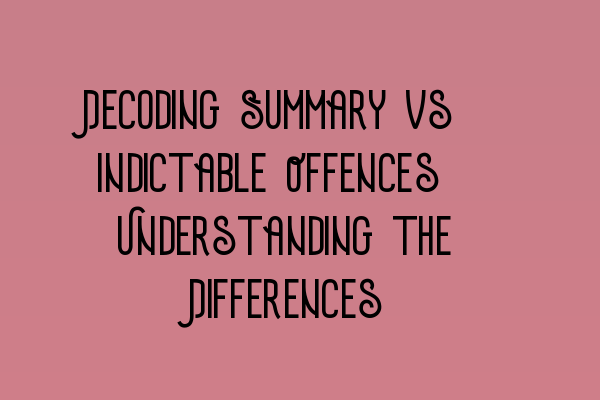Decoding Summary vs. Indictable Offences: Understanding the Differences
When it comes to understanding criminal law, it’s crucial to have a grasp of the differences between summary offences and indictable offences. These terms may sound intimidating, but fear not. In this article, we’ll break down the complexities for you so that you can navigate the legal landscape with confidence.
Summary Offences Explained
A summary offence, also known as a minor offence, is one that is considered less serious in nature. These offences are typically heard in the Magistrates’ Court and are dealt with summarily, with no jury involved. Examples of summary offences include minor traffic violations, public disorder offences, and petty theft.
Although summary offences are generally less severe, it’s important to remember that they can still carry penalties such as fines, community service, or even short periods of imprisonment, depending on the nature of the offence. Being aware of the potential consequences is essential, regardless of the offence’s categorization.
Indictable Offences Explored
In contrast, indictable offences are more serious crimes that are typically heard in a higher court, such as the Crown Court. Indictable offences can range from fraud and assault to murder and drug trafficking. These offences are more complex and often require a full trial process involving a judge and jury.
Indictable offences are divided into three categories:
- Indictable only offences: Offences that can only be dealt with in the Crown Court due to their severity, such as murder.
- Either-way offences: Offences that can be heard in either the Magistrates’ Court or the Crown Court. The decision is usually based on factors such as the seriousness of the offence or the defendant’s previous criminal history.
- Triable-either-way offences: Offences where the defendant can choose whether to be tried in the Magistrates’ Court or the Crown Court. This decision is often influenced by legal advice and the potential implications of each venue.
Indictable offences are often subject to stricter penalties, including longer prison sentences and significant fines. The severity of these offences reflects the more substantial societal harm they cause and the need for a more thorough legal process.
Understanding the Differences
Now that we’ve covered the basics of summary and indictable offences, it’s important to understand the key differences between the two:
- Criminal procedure: Summary offences are usually dealt with more swiftly in the Magistrates’ Court, with no jury, whereas indictable offences involve a more extensive trial process in the Crown Court, including a judge and jury.
- Severity: Summary offences are generally considered less serious, while indictable offences involve more significant crimes that often harm individuals or society.
- Penalties: Summary offences may result in fines, community service, or short periods of imprisonment, whereas indictable offences can lead to longer prison sentences and more substantial fines.
- Court jurisdiction: Summary offences are heard in the Magistrates’ Court, while indictable offences are primarily heard in the Crown Court.
Understanding these differences is crucial for defendants, legal professionals, and those studying criminal law. By grasping the distinctions, individuals can better navigate the legal system and make informed decisions regarding their cases.
Conclusion
In summary, knowing the differences between summary and indictable offences is essential in understanding the legal landscape. The severity, court procedures, and potential consequences vary significantly between the two types of offences. By arming yourself with this knowledge, you’ll be better equipped to navigate the complexities of criminal law.
For more legal insights and resources, be sure to check out our related articles:
- SQE 1 Practice Exam Questions
- SQE 1 Practice Mocks FLK1 FLK2
- SQE 2 Preparation Courses
- SQE 1 Preparation Courses
- SRA SQE Exam Dates
